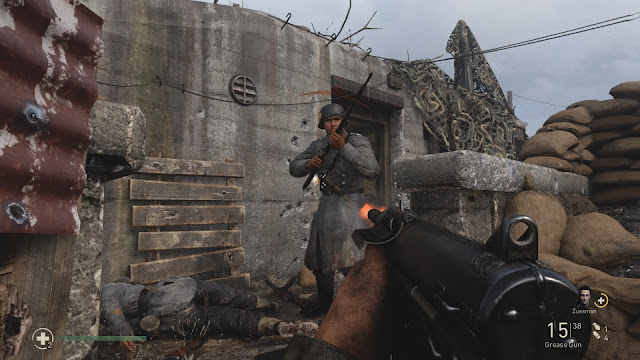Call of Duty: WWII numbs the mind, assaults the senses, and rarely convinces me that it depicts war realistically—though it fakes realism with impressive confidence. The characters bark dumb military jargon, yearn for the war to end, and yet seem perversely thrilled to be model soldiers. I couldn’t care less. I have an easier time accepting death-defying set pieces, like a chase where you drive a jeep alongside a train, trying to derail it while dodging machine-gun fire from its wagons. Peter Jackson would be proud.
Clarity is the game’s most impressive achievement, and a testament to strong level design. Amid constant explosions and deafening gunfire, I always know what I’m supposed to do. When I fail, it’s usually my own fault for not reading the environment carefully enough. Crumbling cities, open fields, and foreign village streets are easy to navigate, and weapon placement subtly telegraphs what’s coming next. Finding a sniper rifle is a relief—I know I’ll be picking Nazis off from a safe distance. Finding a bazooka, on the other hand, makes me panic.
What’s most striking is how similar this feels to the Call of Duty I remember from decades ago: cutscene, firefight, cutscene, firefight, in a rigidly linear chain until the credits roll. The chaos and intensity are real, but so is the constant intrusion of scripted storytelling that interrupts the flow. Just as you find your rhythm, the game stops you to rearrange the conditions. It’s easy to see why many players prefer the freer, systemic design of multiplayer.
The campaign’s eleven missions (twelve if you count the epilogue) take you from the beaches of Normandy on June 6, 1944, to the liberation of concentration camps in the spring of 1945. Unsurprisingly, these are the moments that linger most. The Normandy landing is punishing, forcing you to learn the controls under fire. Realistically, you shouldn’t survive even the opening moments—but total realism in a war game would be unbearable. You’d spend hours marching or hiding, only to die in an ambush.
If the mechanics feel old-fashioned, at least the presentation is impeccable. You barely have time to appreciate the detailed environments—sunlit French villages, snow-covered Ardennes forests—before motion blur turns them into fleeting impressions. Still, they establish a strong sense of place that’s difficult to convey through screenshots alone.
You play as Private Daniels (Brett Zimmerman), a pawn in this power struggle and a man haunted by his failure to live up to his older brother. The writers aim for a personal redemption arc, but I never buy into it. Withholding key details until the end only weakens the impact, and when the emotional payoff relies on tired clichés like “You ain’t got nothing to prove” or “Glad you got my back,” it rings hollow.
The campaign doesn’t sustain that quality for all six to eight hours, but despite its unevenness, it ends up moderately enjoyable. When it embraces its core strength—direct, man-versus-man combat—I’m willing to keep playing. The moment it tries to be anything else, I’m out.







Comments
Post a Comment